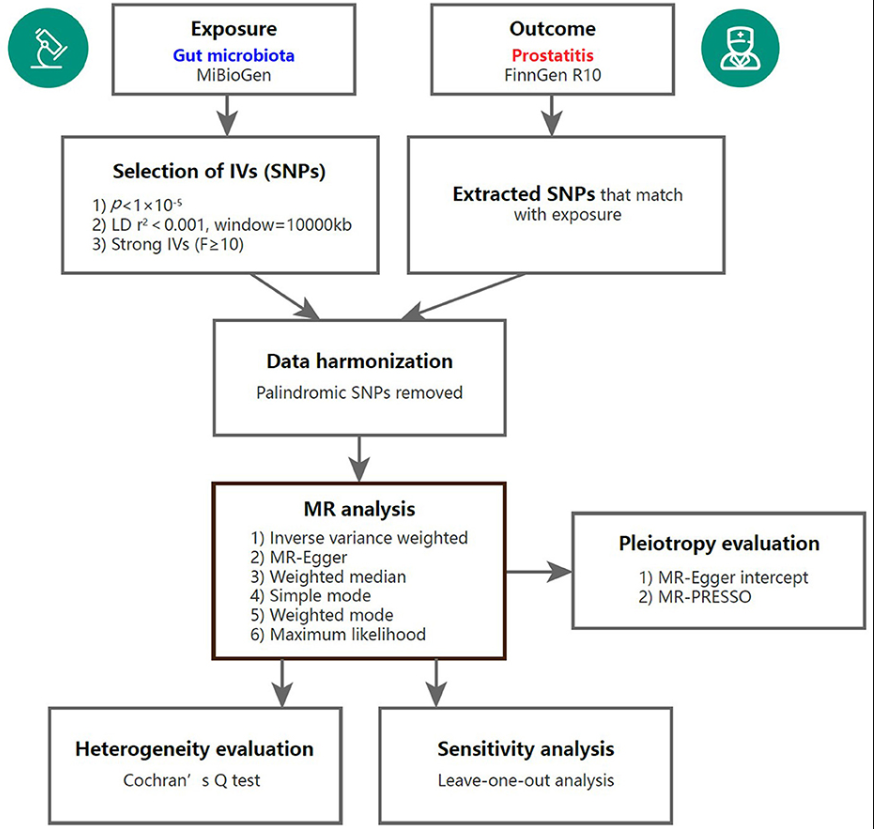Prostatitis, a common health issue affecting adult men globally, poses significant challenges to quality of life and can lead to psychological distress. Despite extensive research, the etiology and pathological mechanisms of prostatitis remain complex and heterogeneous.
Researches carried out genetic analysis investigating the association between GM composition and prostatitis using genome-wide association study (GWAS) data and Mendelian randomization (MR) analysis.
Key Findings:
Odds ratio (OR) and 95% confidence intervals (CI) were calculated.
- GM Taxa Associated with Increased Prostatitis Risk:
- Genus 𝘚𝘶𝘵𝘵𝘦𝘳𝘦𝘭𝘭𝘢 (OR: 1.37, 95% CI: 1.09–1.71) and genus 𝘏𝘰𝘭𝘥𝘦𝘮𝘢𝘯𝘪𝘢 (OR: 1.21, 95% CI: 1.02–1.43) were positively associated with an increased risk of prostatitis.
- These findings suggest that higher abundance of 𝘚𝘶𝘵𝘵𝘦𝘳𝘦𝘭𝘭𝘢 and 𝘏𝘰𝘭𝘥𝘦𝘮𝘢𝘯𝘪𝘢 in the gut microbiota may contribute to an elevated risk of developing prostatitis.
2. GM Taxa with Potential Protective Effects Against Prostatitis:
- Phylum 𝘝𝘦𝘳𝘳𝘶𝘤𝘰𝘮𝘪𝘤𝘳𝘰𝘣𝘪𝘢 (OR: 0.76, 95% CI: 0.58–0.98) and genus 𝘗𝘢𝘳𝘢𝘴𝘶𝘵𝘵𝘦𝘳𝘦𝘭𝘭𝘢 (OR: 0.84, 95% CI: 0.70–1.00) exhibited a negative association with prostatitis.
- These results suggest that higher levels of 𝘝𝘦𝘳𝘳𝘶𝘤𝘰𝘮𝘪𝘤𝘳𝘰𝘣𝘪𝘢 and 𝘗𝘢𝘳𝘢𝘴𝘶𝘵𝘵𝘦𝘳𝘦𝘭𝘭𝘢 may confer a protective effect against the development of prostatitis.
3. Consistency Across MR Analysis Methods:
- Multiple MR analysis methods, including inverse variance weighting (IVW), MR-Egger, weighted median, simple mode, weighted mode, and maximum likelihood (ML), yielded consistent results supporting the associations between specific GM taxa and prostatitis risk.
- Sensitivity analysis confirmed the robustness of the main findings, indicating minimal influence from heterogeneity and horizontal pleiotropy.
4. Potential Mechanisms:
- Genus Sutterella and Holdemania may contribute to prostatitis risk through mechanisms involving intestinal barrier function compromise and induction of pro-inflammatory responses.
- Phylum 𝘝𝘦𝘳𝘳𝘶𝘤𝘰𝘮𝘪𝘤𝘳𝘰𝘣𝘪𝘢 and genus 𝘗𝘢𝘳𝘢𝘴𝘶𝘵𝘵𝘦𝘳𝘦𝘭𝘭𝘢 may exert protective effects against prostatitis by enhancing host immune responses, modulating inflammation, and promoting hormonal balance.
5. Limitations and Future Directions:
- The study was limited by the availability of genetic data at the genus taxonomic level, precluding analysis at the species level.
- Subgroup analysis based on prostatitis subtypes was not feasible due to data limitations, highlighting the need for further research in this area.
- Population stratification may have affected the generalization of findings beyond European ancestry populations, warranting replication studies in diverse ethnic groups.
This genetic analysis provides novel insights into the potential causal relationship between GM composition and prostatitis risk. The identification of specific GM taxa associated with prostatitis susceptibility highlights the importance of GM modulation in preventive and therapeutic strategies for prostatitis. Further research is warranted to elucidate the underlying mechanisms and validate these findings in diverse populations.
Link to the study : https://tinyurl.com/95przacw
